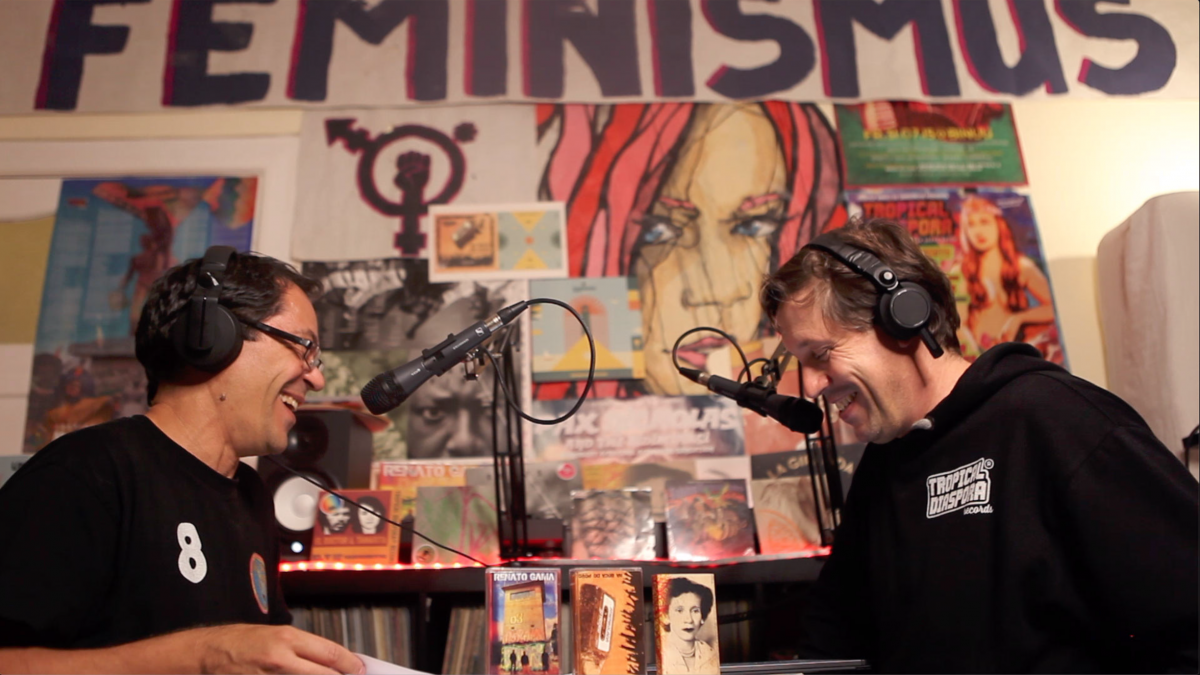☆☆☆
Established in 2015 in Berlin by the DJ and producer DJ Garrincha (São Paulo, Brazil) the label goes back to the 1990’s Berlin, at a time of underground parties and a very exciting cultural milieu where DJ Garrincha was active. In 2008 he started the event called Tropical Diaspora, soon joined by the cultural scholar and DJ DR. Sócrates (Vigo, Spain).
The independent record label, and event, Tropical Diaspora®️ Records has as its main focus the production of vinyl records of the Afro and Native cultural diasporas.
The logo of the company perfectly expresses this goal. It represents a woman in the shape of the Atlantic Ocean whose hair symbolizes the sea currents that brought African populations from Africa into the Americas and still guide today thousands of immigrants ashore. These stories of diasporas forced by enslavement or for economic reasons, fleeing wars and poverty, are the stories that we at Tropical Diaspora®️ Records are interested in.
We are committed to create a musical narrative about the people who crossed the Atlantic from Africa to the Americas, the encounter with the oringinary people and gave rise to cultural expressions that reflect both the horror and hope of that experience. As we carry out our musical research, we come face to face with the question of how to address the cultural life of communities that have been dispossessed for many centuries. Ways of looking and narratives need to be handed back, as we observe with sadness how mainstream recording companies are still in the business of taking advantage of, expropriating the cultural heritage of Africa and the Americas.
Our language is music. We feel obliged to empower the people we work with by means of giving them the chance to control their own narrative. We emphasize cross-cultural experiences that show the manner how communities take their past and present into their own hands. And we are glad to be an instrument for this purpose.
List of releases on vinyl (September 2021):
- Bugiganga Tropical Vol.1 – Super Spanish Combo & Banda Jardes • 7“ 45 rpm
- Bugiganga Tropical Vol.2 – Doctor Nativo • 7“ 45 rpm
- Bugiganga Tropical Vol.3 – Forró De Cabeça • 7“ 45 rpm
- 2 La Dame Blanche • LP 12“ 33 rpm
- Transilvanians • Two Fireworks In Hi-Fi • 7“ 45 rpm
- La Giravida – La Fanfarria Del Capitán • Gatefold LP • 12“ 33 rpM
- El V and The Gardenhouse • El Doctor & Tamarita • Color • 7“ 45 rpm
- Tropical Diaspora #1 – Compilation • Transparent • 12” 33 rpm
- Renato Gama – Olhos Negros Vivo • Color • Gatefold LP 12“ 33 rpm + Nhocuné Soul – Ogunhê • 7“ 45 rpm
- Renato Gama – Berlin • Color • Gatefold • LP 12” 33 rpm
- RAPadura – Universo Do Canto Falado • Color • Gatefold LP 12“ 33 rpm + 7″ + Tape Cassette
- Gekah – Orgullo De Barrio • EP 10“ 45 rpm
☆☆☆
All that we are not and will never become
– Tropical Diaspora® Records’ position facing cultural appropriation
Let us begin by stating that the language in which we write is alien to us. But like any other means of communication language is also an arena of struggle. We use language as a weapon.
The culture of colonized people is managed in the metropolis of the Western world. It has been incorporated in the system of cultural classification of the West. Ethno, Afro, Latin, World… they are all names that give Westerners means of recognition and difference: while it is Afro, it is not from us. It seems to bear the stamp of cultural exchange, but it doesn’t; and we have a problem with that. Why is it so? – For the sake of the argument we consider the culture of the colonized as culture produced outside the West, or in the West but by non-Westerners, and opposite to the culture of the colonialist. It goes without saying that the West is mainly Europe and North America, excluding Mexico and all the regions inhabited by native people in those territories.
The current state of affairs is a system that has Europe as its center. Every system with a center has its periphery. Peripheries have been shaped by the appetite of the center, while the center works as point of reference for its periphery, we should say as a mirror in which the periphery looks at itself, although not as it is but as it should be. Through the technical means of reproduction, the channels of distribution and the fetishization of social media as the true public sphere holding promise of access, the colonialist tells the colonized: look at what we have achieved, don’t you want to be like us?
This system of center-periphery has been with us since modernity, since the dawning of capitalism. We go so far as to claim that it is a specific invention of modernity. And this has consequences, because modernity coincides with the so-called discovery of the African continent and the Americas. The ships of the slave trade came to be the experimental ground for the later development of the capitalist factory that would enslave thousands around the globe, while the mines exploited in the Americas will pay for the Industrial Revolution. The famous Potosí mines and the expression, still in use, vale un Potosí: be worth a Potosí, symbolizes a social and economic development with the help of which the center grew, and still grows, at the expense of the periphery. Stories about the sucking vampire and the sucked zombie are more than symbolic narratives. They graphically describe the global work place.
The white European who cares about the peripheries never sees himself as a colonialist but as savior. Why is that? Why does Europe posit itself as savior?
Europe is constructed as a culture of saviors, who know better about the Others in the periphery. Linnaeus’ classifications, Humboldt’s love for American flora collude with Rhodes’ passion for the telegraph and the portrait of Elihu Yale, whom the famous university is named after, while enjoying a cup of tea in the company of a fettered young African slave. Europe is the place of a culture that gives itself the right to known and to save. But, who is saved by Europe and of whom does Europa save her? Of course, Europe thinks that it saves the Others from themselves: from their corruption, their ignorance and atavism, their innate maladies… Recently, a young German philosopher stated the following: ‘due to its past Europe is best equipped to find an answer into achieving social justice and democracy for the future of humanity’. This is a strange statement for a philosopher. The young German thinker is full of ignorance. The poem of Ikwunga states clearly from where Europe took its equipment, it unveils the consequences of the philosopher blindness. It goes as follows:
The bombs are made in London
But the bombing is in Congo,
The bombing is in Togo.
The tanks are built in Russia
But the shelling is in Angola,
The shelling is in Rwanda.
The jets are built in Germany
But the air raids are in Freetown,
The air raids are in Asmara.
The bazooka is from New York
But bazook is in Nigeria,
Bazook is in Mogadishu.
Cocoa grows in Nigeria
But we buy chocolate from Belgium.
Sugar cane grows in Jamaica
But the tea is sweet in Toronto,
Life is sweet in Toronto.
Diamonds rain in Sierra Leone
But they don’t have hands to catch them,
They don’t have hands to wear them.
Gold is plenty in Kinshasa,
Gold is plenty in Maputo
But they store the gold in Swiss banks.
Cotton blooms in Mali,
Cotton grows in Cameroon
But they beg for pants from Paris,
They buy used cloths from Paris.
Look at a compilation of so-called World Music, as it is typically done in the US or Europe. The production is the best, the edition is superb. Through the technical means of reproduction the colonialist asserts his supremacy, his domination. He cares. No complaint can be made. Surely, he knows how to do things right. A salsa song bears the name of its Western producer in a YouTube channel. African rhythms from Barranquilla are so recorded that the Westerner can recognize them as African. The sounds of the Amazonian forest become a myth to recover from oblivion, and when Dona Onete release a video clip the sharks of the music business go insane: which of them will take the credit for that? In the mean time, Bob Marley despised Eric Clapton’s version of ‘I shot the sheriff’ because he obviously understood nothing. The powerful cultural institutions of the European national states are happy to back this colonialist penetration in the name of the Other, because they know better. So we end cheering up Humboldt’s achievements as if they were our own.
The colonialist sees the native as prey. The native sees the colonialist as predator – rephrasing a famous idea about the life relations in the tropical forest by a renowned anthropologist.
But there is a catch. Because of the power that the West exercises through its networks of distribution that spread worldwide an ideology of healing and restoration, and through the technical fetishism it professes, World Music compilations become a standard about the culture of the colonized. They become coffeetable recordings, the opportunity to engage in intelligent conversations among white educated people while perpetuating myths of authenticity commonly attached to ‘primitive’ cultures. They reinforce the belief that you are well informed about the Other’s culture, the culture of the colonized. This is exactly what the Marco Polo’s syndrome is about. As the culture of the Other came to be know through the eyes of the well-known Italian merchant, we become disappointed when the Other doesn’t behave like Marco Polo taught us, and we demand from her to behave accordingly. World Music forces people to behave according to Marco Polo’s standards, so to speak. In the cultural encounter Westerners create stereotypes with the help of corporate money. Corporate beliefs are incorporated and become the engine, while the cultural politics of the European national states reaps the profits. Philanthropy as a bad joke.
But this is not the worst part of it. The worst part of it is that the acquired knowledge can be used to speak with the colonized about its own culture; in fact, to teach her about her own culture, to show her how her culture should be represented… cooked and swallowed. Eventually, it becomes the only means that the native has to speak about her own culture.
Colonialists have always granted themselves the right to represent Others, to measure them against their own scientific and artistic achievements. Record labels perpetuate this ideology when they create through recordings the plane where those featured are kept alive as Others, the strange subject of the colonialist curiosity and inquiry. By claiming the words World, Ethno, Afro or Latin the colonialist gives the impression of universality. But this is a misrepresentation. Through these recordings the colonized learns to act as African, as Latin, as Native in the eyes of the white supremacist. It means, the colonized has been stripped of her own humanity and universalism in order to become a puppet.
All this is what Tropical Diaspora® Records isn’t about, and will never become.
We would like to thank Frantz Fanon, always a source of inspiration.
At Tropical Diaspora® Records we are committed to create a narrative, musical and otherwise, about the people that crossed the Atlantic from Africa to the “Americas” and gave rise to different cultural expressions that reflect both the horror and hope of that experience. In creating such a narrative we are however aware that the tools we use to communicate our idea and mission are shaped by the historical narrative of the imperialist powers; the hegemonic role that, for example, language play: French, English and Portuguese in Africa; Spanish, Portuguese and English in the “Americas“. We are even to blame for using English as lingua franca for our purposes. But, is it silence a better option? We won’t be silent. We want to speak; we believe that we have the right to speak and will use whatever means we have at our disposal in order to open up a communicative interface that is respectful of the history and legacy of the communities whose experiences, struggles and worldviews steadily groove like in a vinyl record our own work at Tropical Diaspora®.
As we carry out our musical research we come face to face with the question of how to address the cultural life of communities that only became part of the historical record from the moment Europeans became aware of their existence, which further means that their history is shaped by the way of looking at, by the narratives of the Europeans traders and colonialists, terms that from the perspective of colonized continents would be better described as genociders and criminals.
We oft refer to the “Americas” in order to emphasize the unity of the continent from the north to the south, or we speak about the African Diaspora. However, are these terms accurate? Since the word “America” is a derivation from the name of the Italian explorer Amerigo Vespucci as generalized by the German-Flemish cartographer Mercator, it is clearly inadequate to designate the rich complexity of the original communities living in the continent. The term “America” signals the coming into history of these people from a European perspective. But this history is not their history.
We, at Tropical Diaspora® Records, are committed to purge our language from any sign of disrespect. And this statement wants to be a first step. We oblige ourselves to empower language and fill it with meanings of struggle and emancipation. Our language is music. We emphasize cross-cultural experiences that show the manner how communities take their past and present into their own hands. And we are glad to be an instrument for this purpose. Our collection of records Bugiganga Tropical goes in this direction, as well as our recent tribute to the social revolutionaries Sócrates Brasileiro Sampaio de Souza, better known as Dr. Sócrates, and Hydée Tamara Bunker aka Tamarita or Tania in a 7 inch record by the Bolognesi El V and the Gardenhouse. It is this powerful social internationalism what we understand under the name of ‘the Americas’. And in this manner we follow in the footsteps of the great Fela Kuti, who created a powerful truly Pan-African musical language that today is conquering the world.
Dj. Garrincha & Dr. Sócrates
In the 1990s I swapped the tropical concrete jungle São Paulo with another concrete jungle in Northern Europe, Berlin. An immigrant, a foreigner, a refugee, a “South American guy” in another diaspora, fleeing from the catastrophic economic and political situation in Brazil, I decided to share my passion for the musical heritage as Dj GArRinchA. Never mind the former and current politics in Brazil, let’s go back to where it all started, for me anyways. In the early 1990s, the political map of the world saw profound changes with Germany and the once divided city Berlin at the epicenter. Before the Berlin Wall did not only divide this city, it was also the most obvious manifestation of the political crack which had been running through the world after WWII. Shortly after the wall fell the entire Eastern bloc started to totter and finally collapsed.
After the reunification, many West-Germans along with people from all over the world came to Berlin. Others from East Berlin could not wait to leave. Abandoned by their previous owners, places in the Eastern districts were squatted. Unlicensed and thus illegal bars would pop up on every corner and disappear or move to a different place within a week. A thriving art scene with newly opened galleries emerged in rundown houses. Coming to Berlin in the 1990s was like entering a laboratory with transformation taking place at any corner and affecting any aspect of life. This transition generated a vacuum that made people feel almost like creators shaping part of tomorrow’s world by trying out new things while the old was retreating and the new was still to come. In short, Berlin became the center of the young subculture in Europe.
In this spirit a new movement was born, which I call the “Latin American Way” of the Berlin subculture. Among the first places where this yet-to-be-born scene gathered was the Freitags Bar (German for Friday’s Bar), one of the various unlicensed bars at the center of the former Eastern part of the city. To me, this place embodied perfectly the spirit of that time. Only people who knew about it would come to this gloomy cavernous place in the basement of a pre-WWII building. Each time there was the risk that the party would be called off by the police which made every single event not only slightly adventurous but all the more precious. Thanks to the Latin American affection of the host, music and drinks from South America set the tone. The DJs staging there had no names yet and put music on that nobody knew, the Brazilian cocktail Caipirinha still had the charm of novelty, its rum base Cachaça was a rarity and quite pricey.
Initially as guest in that gloomy cavern then as “employee” sitting upstairs by candlelight, i was the doorman. After a while i began to provide CD compilations with Brazilian music to the guys that did the music in the basement i.e. DJ´ and suddenly i could listen that music been playing again and again the parties downstairs. The logic consequence was to play my compilations by my self, also this was the begin. After a while i was a resident and began to mix Brazilian music, first of all with the all known Spanish Latin-American songs and later with Balkan music, a style that came in the taste of the people in the early 90ies. Just like that we promote almost every week the party in the Freitag´s Bar and one day a friend of my came to me and ask “…who is this singer you play every week in your set…? with this amazing voice! ” my answer was who-else if not Elza Soares!
Another Friday in the bar and this friend came again to me to say that he knows who this singer is, she was Garrincha´s wife! After that he said… ”you are the Dj Garrincha also…” and because was no night where I’ve played Elza Soares i accept that suggestion. So that night in that basement was the birth of Dj Garrincha. Not only i got a dj name, after my “baptism” everybody began to have dj names in the bar and some of them are active day now in Berlin like Dr.Sócrates and Andy Loop in Barcelona (by the way the asking guy in the history above).
But the most impressive personal experience for me back then was in 1996 after the concert of Chico Science & Nação Zumbi, when I met these musicians in the Freitags Bar. Yes, Chico Science was there in this very basement bar in the Mulackstraße, a place which, unfortunately, due to gentrification does no longer carry the taste of the 1990s. To point out not only the importance and meaning of this place in the early 1990s but also its effect, I should add that the most popular Latin American events in Berlin nowadays are produced and organized by people who used to be regulars at the Freitag´s Bar and whom I keep meeting at those events as today at the: TROPICAL DIASPORA in Berlin.
One of the lasting encounter at this basement existing today was that one with the guy that did the “doorman job” after me, today´s resident DJ Dr.Sócrates, his definition of Tropical Diaspora could´t be better…
I know Dj Garrincha for many years. We both share the love for unconventional music without labels or prejudices. We have shared many djs sessions, some good moments, some bad ones. But we haven’t given up our dream of collecting musical experiences that do not fit quite rightly what the mainstream expects for djs firing the dance floor. As Dj Garrincha told me about setting up a musical “tropical diaspora” supporting local bands and good music I couldn’t say no. For me “diaspora” means the constant movement in search for life based musical experiences, the traveling around of rhythms which are the result of suffering and exploitation as much as of a joyful sense of life.
“Tropical Diaspora” performs in the past in a emblematic venue where we try to create a room for empathic sharing. Instead of market professionalism we like to emphasis a true naive amateurism, though not in a pejorative sense. We claim the right of being amateurs of the dance floor, that is, literally, lovers, “amadores” as we call it in Portuguese. Surrounded by an ocean of mainstreams, the “Tropical Diaspora” party is an island of, simply, music. This is a music that is born uncut from the lives of the people. It is organic not manufactured; it grows from life’s stories. We respect that. “Tropical Diaspora” means music without preservatives, but as it simply is: “Tropical Diaspora”, the place to be in Berlin.




Social